#it was so weirdly emotional and stress inducing but it felt good to really be heard ☺️
Explore tagged Tumblr posts
Text
it’s my birthday today :3333 :DD
#everything is WACK#i kinned deku too hard and cried all week and then mustered all my strength to defeat my local villain#(this week has been SO CHAOTIC and i wanna write all about it but also i’m so tired from talking about it agdjfjd AH#but i organized a meeting with my bosses and some other girlies on behalf of all the girlies i work with#to make our bosses hold our resident creep accountable and hopefully get him fired :D#this guy has been making my life hell for like a year and has been creeping on this new girl and ahhhh#ah it just feels good to put all the pieces together and make a big deal and realize our bosses have our backs!!#but i literally cried so much this week like it was not easy!!!!! AH#it was so weirdly emotional and stress inducing but it felt good to really be heard ☺️#anyways being nonbinary + masc i feel kind of distant from my womanhood most of the time but this week i’m like!!!! yes yes yes girlies#anywhoooo#<3#perbsonal
12 notes
·
View notes
Text
Complaining about me having Food Issues. This is vaguely whiny and has way too many details and wow I’m gonna regret posting it!
Also, caveat: this is a vent post, but pretty much everything in my life is amazingly good right now and I am so lucky. Not representative of my broader brainstate.
Advice welcomed. “This part sounds stupid and distorted-thinking-y” especially welcomed.
CW: If there’s anything health or food/weight-related you want to avoid you should probably not open the readmore; the post consists mostly of detailed discussion of Things That Look Like An Eating Disorder.
The last half of 2018 was bad for me; it culminated in me dropping out of college and finally moving away from my parents (like, half a continent away), and things are weirdly better now. I am happy and healthy-adjacent and resolving Personal Problems that have been insoluble for most of my life.
(The home environment was not conducive to proper emotional development.)
Almost every part of it has been strangely easy. Getting an apartment, getting a job, managing money, catching up on the Normal Young Adult social skills. It feels like I’ve just got more cognitive resources to devote to life, now.
...The only thing that hasn’t become easy is food.
I don’t get hungry often enough, and when I do experience hunger, it doesn’t motivate me to eat (I’ve been describing this as essentially pain asymbolia but for hunger). I also just don’t enjoy eating -- intellectually I can recognize when food tastes good, but it’s still unpleasant to eat it. (Not an anhedonia thing! Other pleasant stimuli are far more enjoyable than they were a few months ago and life is amazing.)
There also are a lot of gastrointestinal symptoms -- nausea and pain, et cetera. They have been present at a low level for a while but worsen when I don’t maintain a relatively stable caloric intake. (I can’t eat because I am in pain! I am justified in not eating! Never mind that eating causes significant pain specifically because I haven’t eaten in a few days.)
Inflammatory and celiac markers are normal, IBS could explain part of it but not really the upper GI tract symptoms. It is maybe plausible that this is an autonomic thing? I already have a lot of autonomic dysfunction things and sometimes people with my connective tissue problems have weird gut motility. (Incomplete listing of symptoms I get that are plausibly gut-dysmotility-related: passive regurgitation and GERD and cramping and diarrhea and upper GI pain and vomiting and postprandial nausea/fullness and occasional difficulty swallowing and other things I am forgetting about right now.)
It also is plausible that at least some of this is psychosomatic -- stress sometimes seems to make it worse -- but the broader cluster hasn’t always coincided with periods of emotional stress. The first time the symptoms interfered with my ability to eat was during one of the happiest and most low-stress parts of my life, and it definitely preceded the Food Doesn’t Feel Good problem. (And autonomic dysfunction worsens with stress too.) Although it maybe helped condition me not to want to eat, since eating causes a grab-bag of annoying symptoms.
(the most accurate diagnosis probably is “neurotic-intellectual with-ill-defined-GI-problems syndrome”)
Having food in my stomach feels bad and wrong in a way that is not about the physical pain. (Meal replacement shakes and protein powders mostly fix this but are not financially feasible, are often incredibly low-calorie, and also if I’m mostly doing liquid calories I get worse physical symptoms when I do solid food.)
The maladaptive food behaviors have been present on and off for most of my life, and the GI symptoms have been a thing since like... early 2018?, but last semester was the first time I’d consistently gone for months with an energy deficit; I’ve had a lifelong tendency to not do well with eating but never to this extent. But this was -- there were some weeks when I ate maybe four meals, some two- or three-day periods when I didn’t eat.
Predictably I lost weight. (Weight loss is not good! I like having energy stores and muscle mass and also being able to sit on the floor without my ass hurting.) I lost enough weight that my doctor got really worried; I was not overweight and am edging down towards the lower end of the reasonable range. She was definitely worried in the context of physical symptoms, but I suspect that if I had presented the cause of the weight loss slightly differently, she would have been worried about the psych component. It’s stupid too. I do not want to lose weight! I want to have enough energy to do shit without dipping into fat stores!
Also last semester: vomiting. The postprandial nausea occasionally has been bad enough that it makes me vomit. (I have a supply of ondansetron and this is no longer an issue.) More frequently the postprandial nausea is bad enough that I can’t tolerate it, it’s a constant reminder that there is food where it should not be, and I induce vomiting. I haven’t done this since I moved out, but I have really really wanted to. Ondansetron helps here too but not completely. Or I don’t have nausea, but there is food in my stomach and this feels really unpleasant and, well, there’s one thing that’ll fix it right away (plus give me a nice adrenaline rush).
Solutions: ondansetron; don’t go to the bathroom for a while after I eat; if eating at home, try to do meals when my roommates are home so I can’t vomit because they’d hear it; distract myself until I don’t feel horribly full.
(Which takes a while, sometimes. Maybe too long. I have vomited basically undigested food a few hours after a meal. Not sure whether that’s abnormal, and if it is it’s really plausible that I did this to myself by not eating enough. Gastric emptying is not my strong suit?)
...Going days without eating because I just don’t want to. Weight loss. Defective hunger response. Being exhausted and not having the energy to eat. Hiding this from people, too; I had told people about the physical symptoms but not the fundamental aversion to eating, not the going days without eating. Conscious displays: mixing coconut cream into tea, here, I am eating, this is eating, I am making an effort, it is not my fault. And a refusal to reduce physical activity. I generally ate only dinner, if that, but still spent my breaks between classes pacing around campus. Even though I knew I shouldn’t. (Sometimes I justified this as an attempt to maintain muscle mass. That is patently stupid and honestly I could have just done some squats if that was my real goal. I didn’t have a real goal. The closest thing I had to a goal was -- keep moving.)
This guide from a SSC reader convinced me to treat my eating problems like a thing that is actually bad, not like “oh my stomach hurts if I eat so I’ll just not do that.” (Also took it more seriously after I started having difficulty resisting the urge to vomit.) But, uh. It’s scarily familiar. I am trying really hard to eat enough.
I’d hoped that getting out of the supremely stressful situation would help with the eating problems. To some extent it has -- I’ve been able to force myself to eat every day, there’ve been only one or two days per week where I’ve skipped one meal, I haven’t vomited since I left. As of three weeks ago I hadn’t had substantial further weight loss. Eating still is difficult to an extent that I can’t really understand, and it’s difficult when nothing else is. Finding an apartment was easy. Getting a job was easy. Work has been fun and easy and amazing. But pretty much every meal has been a struggle, I’ve been having to force-feed myself, I’ve felt more distress about putting food in my body than about anything else since I left home.
If it doesn’t settle down soon it’ll be pretty tiring. I am concerned that this level of effort is not sustainable.
And... I need to buy a scale. (Spending money is not a skill I have. I don’t like it and I don’t want to do it. Even on food and transportation. So I pretty regularly walk several miles instead of taking the damn bus, and if I forget to bring lunch I just won’t eat at work.) I suspect that I’ve started losing weight again, in large part because my physical activity is way up and I am really busy. Also I underestimate how many calories I need. I am young and physically active and hormonally male and it’s not reasonable to expect e.g. three 500-kcal meals and a snack to let me maintain weight, let alone gain it. It feels like I am eating so much and this probably isn’t true.
(Tracking caloric intake has historically been a bad idea, because my brain doesn’t do effortful things well, and there’s an observer effect: if I have to expend the necessary effort to write down what I ate, I will probably just not eat the thing so I don’t have to expend the effort. This was true even back when I liked eating.)
I don’t know. It might get better -- I’m putting a lot of effort into it but it’s reasonable that the eating problems aren’t resolving in the month and a half since I left home. Everything else has gotten substantially better and the food issues are only lagging by comparison. I am young and impatient. Also, I’ve gone from [regularly going days without eating, vomiting after I eat, losing a lot of weight really fast] to not doing any of that; this is a huge success and I am complaining about it not being completely solved within a month and a half!
In another month and a half I’ll have health insurance. If it hasn’t improved more by then, I’ll try to find a therapist. (Three months of having Significant Food Issues when not in a horribly stressful environment absolutely is enough to justify spending money on the copay.)
...I am worried it’ll get worse and I won’t notice or I’ll try to hide it. I am worried that it won’t get better and I’ll consider getting therapy and then not be able to stomach (pun intended!) the $20 copay, because even though I am financially secure enough for that not to be an issue, it’s twenty dollars and I don’t spend money on things. I am worried that it won’t get worse but it also won’t get better and I’ll have to spend the next several decades hating food and intensely wanting to vomit for like an hour after every meal.
(There are safeguards and I probably will not hide symptoms getting worse. I am pretty confident I can make myself find a therapist. I’ve had this problem for only six or seven months and most of that was under circumstances that extremely will not continue and I’ve gotten way better at handling it and it is way too early to be worried about this lasting indefinitely.)
Eh, I don’t know. I am handling it, I am taking steps to handle it. It sucks but I’m not concerned about my ability to handle and/or fix things that suck. Life’s awesome. Worst-case scenario is I just have to spend stupid amounts of money on meal-replacement drinks and get all my calories that way.
The best-case scenario, according to my brain: a doctor prescribes meal-replacement drinks and I get adequate nutrition and don’t have to eat solid food and also don’t have to pay for it. This would be really nice! I recognize that it’s not exactly great that I see this as the best-case scenario. A more reasonable best-case scenario: I figure out how to enjoy or at least not actively hate eating, and then I just do that like a normal person.
it’ll be fine even if it kind of sucks short-term
#cw eating disorder#cw disordered eating#cw vomiting#cw health problems#cw weight#cw me being neurotic#just heed the CWs; it's a vent post#personal#news from meatspace#original post#long post
2 notes
·
View notes
Text
Second Look Review: Lion’s Pride 1 & 2
Part 1
So, this is it. The final battle for Earth. Everything that’s happened this season has been preparing us for this very moment.
I’m sweating, guys.
This is nonstop action. So many things are happening at once. So many bad things are happening to the protagonists at once.
I’ve heard the showrunners say several times now that this series is a call back to all the mecha shows from the past, and that’s it’s made for the fans of those shows. I’ve heard plenty of people talk about how nostalgic it makes them, and how it reminds them of watching the shows they used to love.
I was too young for the original run of Voltron, though, and I never really had access to other shows like Macross.
So, I understood in principle, but that same feeling didn’t hit me until these two episodes.
And now I'm’ going to talk about myself for a bit.
---
I can’t even tell you the feeling I was overcome with the first time I watched The Power Rangers. It’s 1993, I’ve been 7 years old for three days, it’s Saturday, and my mind has just been blown. I can’t tell you what it was about the show, but all I knew was that I wanted to be a Power Ranger very, very badly. I can’t, though. But at least I can make believe every Saturday morning.
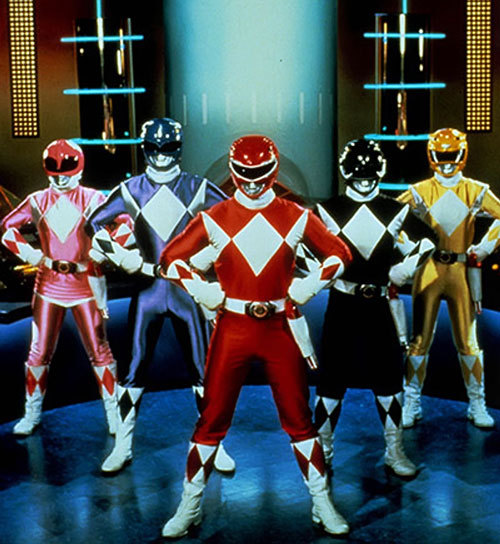
Difficulty: I’m a girl. Girls aren’t supposed to like things like that. Martial arts, weapons, fighting? Inappropriate!
So, as my first act of rebellion, I became a wholly dedicated fan to this weirdly , edited-for-american-audiences sentai show.
I still have that guitar riff stuck in my head. It plays for me when I do things that my parents would find...unladylike.
So, from that day on, my love of mecha shows was on. My parents eventually relented, and I treasured the one action figure we could afford. It was the pink ranger, of course.
But I eventually grew out of my Power Rangers phase, and for years that love lay dormant. Sure, there were other shows out there, animated and live action, but I had no way of getting to them.
Then we got cable, which had Cartoon Network. And Cartoon Network had Toonami.
I was 13 years old, staying up past midnight to watch only-lightly-censored anime, and every night my mind was blown.
Gundam Wing was my drug of choice.

And if my parents hated me watching the Power Rangers, they absolutely despised me watching this.
Despite the protagonists all being 15 years old, Gundam Wing was a mature story. It told of the hells of war, sacrifice, desperation, politics, romance?, and so many other things. It was so very cool.
My parents eventually relented on this, too. I still have the models they bought me.
I was waaaaayyy too into Gundam Wing. I threw myself headlong into the fandom, consuming every fanwork I possibly could. I spent hours going through Geocities web rings trying to find worthwhile fanfiction and fan art (my fave pairing was 1x2, btw.)
Eventually, I came to realize: this show is actually kinda boring. there’s no humor in it. It just...wasn't interesting to me anymore. It was my thing for years, and then suddenly...I was over it.
But it still holds a special place in my heart.
And I told you all of that to tell you this:
The space battles in these episodes remind of of the finale of Gundam Wing.
I felt a good bit of nostalgia, something that doesn't hit me very often. It was nice.
And that nostalgia reminded me of my first rebellion, when I as a girl liked epic space battles and giant combining mechs and nothing was going to take that away from me.
In a way, I still feel like I’m rebelling. And you know what? Being bad still feels so good.
I’m happy to have this show.
- - -
Atlas, known in Greek mythology, held the Earth upon his shoulders. That’s the story these days, anyway. The original myth is that he held up the celestial spheres, in which the stars and planets resided. He’s holding it all up, is what I’m saying.

It’s very easy to see Shiro in all of this. He’s the leader of Earth’s forces, and is part of the last line of defense against Sendak. That’s a lot of responsibility. And he takes it all upon himself. He doesn’t hesitate to go to Sendak’s ship to disable it.
...could this guy be any more of a hero?
But we can’t forget about the ship Atlas, or it’s crew
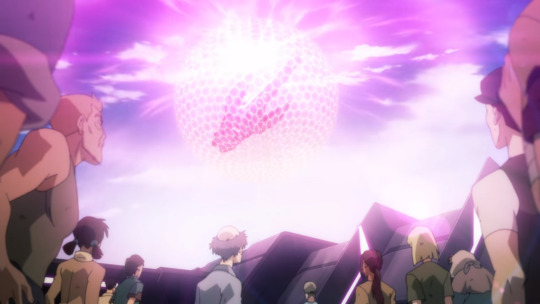
This thing is a beast, and has no right being so powerful. And without the ship, and without the crew to maneuver it into position to block the cannons, the Earth would have been done for. They didn’t do this because Shiro ordered them to.
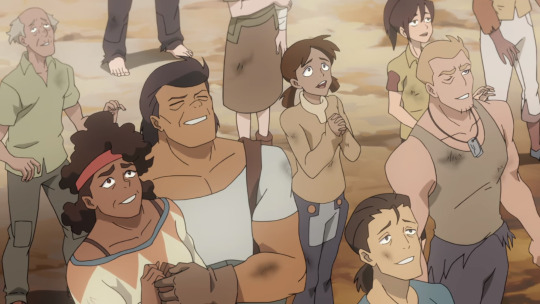
Shiro may be the face of the Atlas, but the ship would be nothing without it’s crew.
-
Back to Shiro now.
This fight he has with Sendak is...just insane. It’s so raw and personal, I almost felt like maybe I should avert my eyes.
But I won’t, for reasons.

Quick question: How are either of them surviving this fall? They’re on the outside of a ship thats falling through the atmosphere, without helmets, and fighting. It’s a sight to behold, for sure, but it’s a bit much.
I’ll let it go, thought, just like I’ll let go the fact that the falling ship hit terminal velocity and didn’t leave a 100 mile wide crater.
I have to ignore that, because Shiro is defeated. And then this happens:


Keith first killed the two pirates in the third episode, then Macidus in the sixth. Before that, none of the Paladins had been shown to kill anyone. I’m still sad about it, in a way. But...better Sendak, than Shiro.
This all seems very symbolic. Everyone seems to have their own ideas about what exactly it means.
In part, I would say this is another moment of Keith never giving up on Shiro. It’s not even about repaying his debt to him; you could argue that that debt was paid in full with interest a long time ago.
Keith knows how much Shiro has been hurt. From here on out, he’s going to make sure that no one ever hurts Shiro again.
As for people saying that Shiro should have been to one to kill Sendak….
I think that the less he has to fight, to kill, to call back those days in the arena, the more he can heal from the trauma of being The Champion.

- - -
So that’s dealt with. Sendak’s dead. Earth is safe.
How’s everyone feeling?

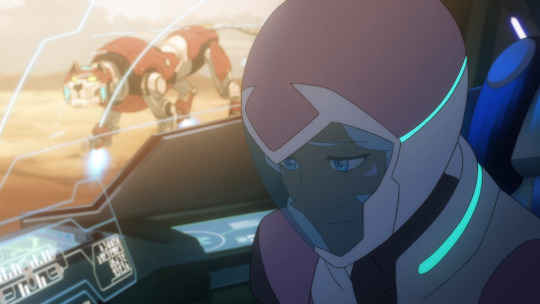
….ugh...stop that...lol.
Ok, whatever. Let’s go home.

Mmm..yeah. This may as well happen.
Part 2
This fight is really something.
First off, I couldn’t help but think that this mech looks like Livia sas Junius from Final Fantasy XIV.
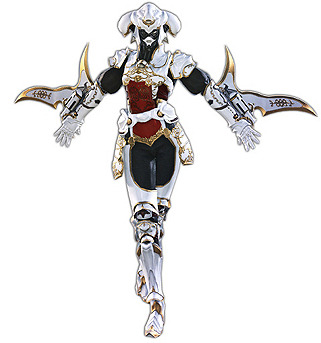

Everything about this fight is terrifying and frustrating. They just won, and for the first time this season, too! And now they’re losing again.
We see now again what was proven in season 6: Voltron was once the most powerful thing in the universe. But time does this funny thing of marching on, and things tend to change along the way.
-
Speaking of changing…
Shiro experiences stress-induced-mech building.
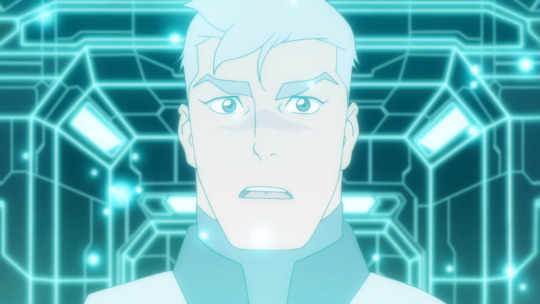
This whole process is amazing. The animation, the music, the timing...everything! Paired with the fact that I had no idea this was going to happen, I was blown away.
And we have no idea how or why this is happening. Could it be the Castleship crystal they installed in the ship? Is it the gem powering his arm? Could it be both? We definitely get some centering shots on those two items as the transformation happens.
Before, we’d been told that the comet ore had be the catalyst for Voltron’s indescribable abilities. But the Atlas is made from Earth materials, save for the new crystal.
Is it Shiro himself?
We don’t know what’s really happening with him. From Haggar’s experiments on him, to being trapped within Voltron’s quintessence, to being pulled away from the Black Lion and placed into a new physical form, a lot of magical hoodoo voodoo has been happening to him.
And let’s not forget: Haggar was most likely using him, in someway, to enter Oriande.
So, why did the Atlas transform? Because Shiro. I don’t know why, or how, but it couldn’t have happened with anyone else.
And with this new creation, he’s going to save his friends. Or...he’ll try to.
Now, for as much as I love the concept of the Atlas, I have a bit of a complaint.
So, I’m watching this thing transform, and everything is light and wonder. And then..I saw it:

Shiro, probably: Fine! I’ll make my own Voltron! With blackjack! And hookers!
….
Have you ever been watching something and you feel all things at once?
That’s how I felt.
At first, it was like:
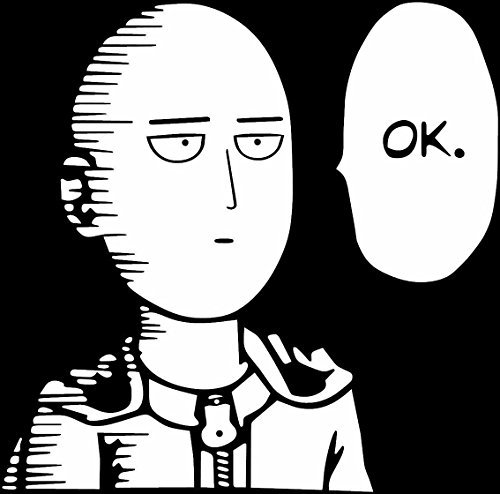
then I was like

and then it was back to
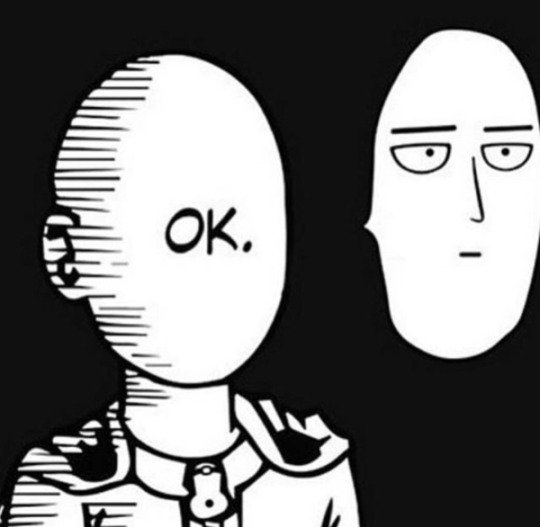
Then I paused the show and did the dishes.
Friends, I hate to say this, but...I don’t like how the Atlas looks. At all.
That transformation sequence had me high on wonder, but when it finished, I crashed back down, hard.
No amount of “ooo she thicc” jokes are gonna save me on this one.
...look at it’s legs!

And what really gets me is that it threw me off so much, that I kinda checked out for the rest of the episode. That’s why these are the Second Look Reviews; because I was being too ridiculous the first time to appreciate them.
I’ve gotten over it at this point, but I was feeling an all consuming “what the hell did I just witness?” at the time.
--- -
Back to it, though.
Shiro transformed that whole damn ship on his own. He saw his friends in danger and he just...did that.
And it was enough to distract the enemy, but not enough.
Thankfully, Voltron was there to save the day.
And then…
Look, this was stressful. You know they’re going to make it; there’s another season left, for god’s sake! And Voltron, while dramatic and sometimes sad, is a hopeful story.
Our heroes can’t die, not now, not like this.
But they don’t know that.
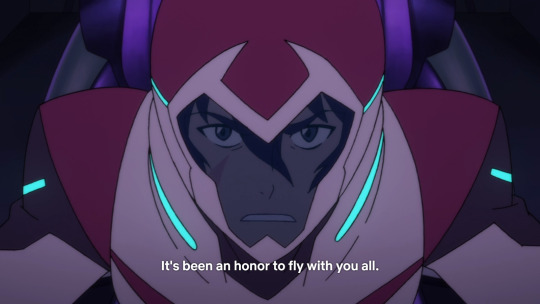

The transition to the funeral, with the lions in the background, was a cruel, cruel fakeout. The emotion in Shiro’s voice here really made me think for a second that maybe they’d actual, ya know...done it.
But it’s ok.
Everyones ok.
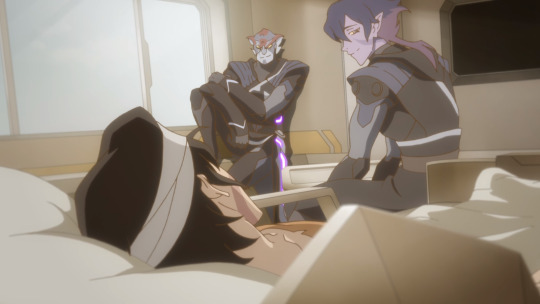
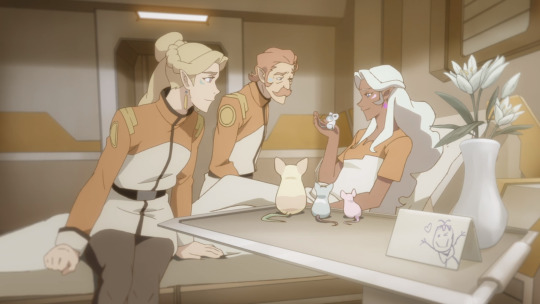


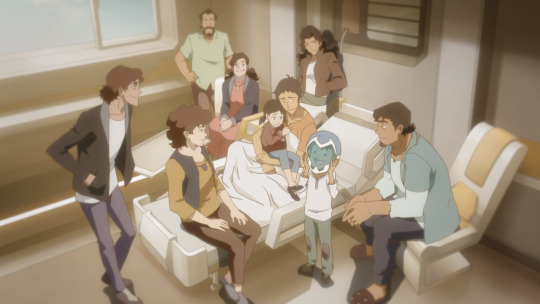
And now, there’s the hope.
The entire universe is coming together to help the Paladins rebuild their home. The team has done so much for the universe, and have nearly sacrificed everything doing so (several times at this point).
This is the good ending. It’s happy, it’s uplifting.

It’s not ending.
---
In summary:
It’s all intense battles and wild nostalgia. These episodes were beautifully put together, from scripting to animation to voice acting.
But just when things were nice and understandable, we get more questions. Questions that I can only hope we get answers to.
Next up: I’ve got a review summary coming up. I’ll talk about my thoughts on this season, the series as a whole, and discuss a few things about next season.
And I took this screenshot
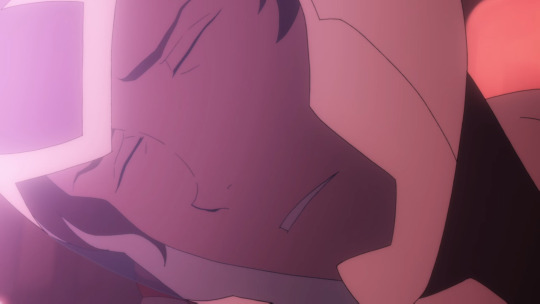
it doesn't have anything to do with my review, but I noticed that curl on the side of Lance’s face. It’s cute. I wanted to share.
#second look review#voltron#voltron legendary defender#shiro#shiro vld#keith#keith vld#hunk vld#lance vld#lance#allura#pidge#long post
2 notes
·
View notes
Text
Solar Return Musings and other Stuff, May 27, 2020
Short note: These are just my solar return rantings and musings, so if you just need the energetic support to get through the crazy energies running around right now, just go to the end of the post for an energetically-infused photo to fill you with love, hope, and courage =) have a great day! OK long-a$$ post coming right up lololol As of yesterday, I have entered my mid-30s, which I would have fretted over greatly have I not awakened to my infinite being-ness. Weirdly enough, priorities do change when a person reaches a certain point in life, and for the past 10 years, maybe more than than or something this body started its own awakening process. It felt weird just thinking about it because my brain took so much time before it awakened, so yeah basically I already manifested nearly ALL spiritual awakening symptoms and I still wasn't doing the work needed, I just though it was all work-stress. I had constant callings to meditate but I was too busy watching anime, movies, dramas, throwing too much of myself to my former uhm, life, stuff, insert words here. Fill in the blanks lol. And then everything just comes crashing down until I had nothing but my own shattered dreams. That's when I slowly started using binaural beats to induce something to happen to my body, or at the very least use my legs (they kinda died along with my hope and dreams back then).
Whew. That felt like a lifetime ago, but honestly it felt so far away even though I only started to consciously-awake 4 years ago or something? Maybe less? I really don't know. Then again, as many spiritually-woke people kept saying, these are interesting times, wherein you live inside a body with as many lifetimes as a buy-one-get a multitude free. Basically as long as a person consciously (or in my case my body freaking chose it for me, dang it) chooses to, anyone can live at least 2 or 3 lifetimes in the same body. I actually feel like I have lived 30+ years in a span of 10, I feel like after having so many losses, meeting so many people both nice and not, all the heck-ups that happened, it’s a miracle I am still alive. What’s even more amazing is that despite whatever hell on earth I experienced in the past 10 years, there were nice parts to be grateful for, like learning more metaphysical stuff, learning what needs to be healed and transmuted like traumas and other genetic stuff, regaining and embodying my old psychic self from my childhood days, establishing clear boundaries because unscrupulous people will DEFINITELY step all over wishy-washy, extremely-giving or doormat people, and whatever needs to be done in order to help clear not just my own morphic field but the mass consciousness energies as well. Seriously though, for me, my best takeaway was learning that I am actually able to channel energies, and if I didn't have a psychic friend to return whatever I channeled I would have doubted everything. So in a way, even though things were seriously slow-going, I guess I'm ok at this pace. It would be better if it was a lot faster though
Speaking of gratitude, I got fed up being ungrateful for quite a while, so for a change I just chose to find something to be thankful for, even if it's just one. I guess it started clearing my energies bit by bit. I couldn't do it all by myself though, so aside from channeling the energies on my own, I also started adjusting the flow of energies (chi or prana) in my own space by bringing in some fallen flowers (they just fall out of the plant even if they look perfectly fine), and I guess it sorta helped me manage my depressive states to a certain degree. In the beginning I honestly just wanted to see some other living thing other than myself and some lizards, or the occasional insects that pop in, and weirdly the flowers helped a lot, even if there were just 3 or even 1 of them in a bowl. I guess it became meditative for me to gather them in the afternoons, before night falls. The flowers resemble hibiscus but they change colors, from yellow in the morning as they bloom, to having red-orange petal tips in the late afternoon or dusk (I gather them during these times) to being fully red at night. After about 4 weeks of doing it daily, I found a trend on how many I can collect per day: Saturdays bring a lot, at most 9 (it's a day that promotes planting and other agricultural pursuits); Tuesdays bring at most, 3? (it is a Mars Day afterall); and the rest of the week ranges from 5 to 7 flowers. I did my best not to put too much attachment to the meanings, I just did my best to be grateful for how many I can pick in a day. As long as I get at least one per day, I'm all good.
Of course, on the day of my solar return, after having difficulty getting some work done (it was hot and humid and everything just feels fuzzy) I finally got out and decided to just check on my passionflower vines and see if I got any flowers from this weird hibiscus plant. As always, the passionflower vines went haywire with the growth again, and I have yet to figure out how to even manage them so they won't strangle the other plants nearby, including the weird hibiscus plant. Speaking of, here's the weird thing about the plant yesterday. It was a Tuesday so I was expecting to just get around 2 or 3, but I got a whopping 14, it was a miracle I was able to hold them in my hand. It felt like the universe gave me a nice birthday bouquet, and I just enjoyed the feeling as I gathered them while a rolling thunder passes over my head. It felt great. Even one of the other flowering plants that only bloom a handful of tiny flowers actually had so much flowers, so I guess it made me giddy. I guess it's nice to receive flowers from the universe, it was a gift that lifted up my spirits. Also it was a small reminder to just embrace my romantic-AF side lol So after thanking the universe for the nice flowers I collected all of the weird hibiscus flowers, gathered them into a bowl, and they looked like these:

If you squint at the photo, the bowl looks like pizza lol but hey, that's a nice thing I could look forward to once citizen mobility becomes an actual thing. I mean, I'm not the only one who got stuck at home for their birthdays, there's like 2-3 months worth of birthdays that got stuck at home, among other things, so I truly feel for those who wanted to feel special even under quarantine. Yes the flower-bowl photo is also energetically-infused so if you're someone who didn't get to enjoy your special day due to the pandemic, please allow the loving energies of the flower bowl to fill you with universal love.
Other stuff I was able to be grateful for was getting a handful of birthday stuff, I mean, in times like these it's easy to expect people to take care more of themselves, and I honestly don't mind if people chose to just do their own thing today. My mother rarely makes birthday food (her birthday is 2 days ahead of mine so I normally just eat whatever is left of that lolol) but I got some fruit salad and it was great, but I think I had way too much and my tummy kept making U-turns. I also got some greetings from people that I care about, and it was nice. The thing about birthday energies is that it brings a lot of mixed emotions, and instead of enjoying the entire day, I had to transmute a lot of old traumas stuck in my head, in my body, all that stuff, to the point that I just decided to send my grateful replies to the messages I received like, today. I wouldn't wanna tie my low vibes with people who wished me well so I did the proactive approach and just cleared whatever low vibes I had. It took a long while, and by the time I was done, it was already midnight and I had to do some quick and soothing meditations just to feel great about myself. At times, whenever I had to do these things, I sometimes wished I never woke up in the first place. Unfortunately, this kind of awakening is like learning how to ride a bike, once you learn how to balance and move forward (hint: pushing the pedal faster makes falling down nearly-impossible lol), it’s forever bonded with your entire being.
Seriously, this whole conscious awakening business is not exactly all sunshine and rainbows, and I often find myself cringing whenever I come across a post or a video about spiritual awakening and the path of enlightenment as something all unicorns and ice cream sprinkles like I have to use ALL of my powers NOT to judge them. Because that's what they have at that given moment, and that is what they wanna share. As for me, even if my own experiences weren't 100% magical, they're not all that bad either. I just choose to embrace all of the experiences as stuff that helps me move forward, good or bad, ugly or beautiful, crappy or not, intentional or accidental, they are all for a better good. It's normal and OK to feel victimized every now and then, we have deep programmings that need to be rebooted so that we can enjoy everything in 3D, regardless of whether we got extremely lucky or extremely screwed. I mean, that's the weird thing about duality and playing that game: seeing both sides of the coin and accepting the fact that it's all the same coin is what brings back our lost power, instead of just choosing all that is light or all that is dark. Everything is connected and that is what sets people free. The only thing that people must consciously choose is to live in their own truth, otherwise choosing to live other people's truths will continuously run their lives, and that's what breaks people. I should know, I was stuck in that crap for a long time. Now I'm currently in limbo but I am doing my best to continuously connect to the higher dimensional realms, and to heal and increase my capacity to feel and receive universal energies so that I won't have to live someone else's life anymore. That's what I promised to do for myself and I am doing the best that I can to uphold that. I honestly don't know where I am right now but I am hoping to become a whole lot better in my own personal journey.
In relation to that idea, I am doing my best to be my own support group, cheerleader, therapist, and all that stuff because to be honest, for the next years and decades after this pandemic issue, there will be a call for independence, of being able to fix the self, because the energies are coming in to change the excessive interdependent natures of people. I mean, don't get me wrong, nothing bad about that right now and we will all continue to be dependent on others, and others will be dependent on us, but certain parts of humanity will start to go inwards, like finding the truth within themselves. Also, there will be a greater need to be kind, understanding, and forgiving to the self, more so than others. Denying the self's needs are what caused disorder in the first place, and universal energies are coming in right now to push people to be more selfish, in a healthy way, in a more abundant setting, because excess greed has taken a toll on the psyche of humanity for a very, very long time. And this time, the higher dimensional realms are ensuring that balance shall be achieved. So if you think this pandemic thing is the worst, well sorry to burst your bubble but more bumpy rides are ahead of us, and adjustments WILL be done to accommodate the new things that need to happen in this timeline, and beyond.
Oh glob, that's a lot of stuff lolol I guess that just flowed out of my hands, and I feel like I'm not even done yet. Oh well, I can always post something else, like I dunno, as needed? Anyway, for those who are only here for the energy-infused photo, here it is, to support your need for hope, love, and courage in these trying times:

I hope you enjoy, just relax and let it come through your being. And if you’re wondering, yeah the cactus has a white bloom. Cute, right? Thank you so much for your time in dropping by this post, I know that times are changing really fast and it feels like we're at the mercy of the elements, but also know that despite things, the universe will always work in our favor, but first we must feel that we're worth that universal assistance, otherwise it's just going to stay outside the realm of our experiences. Our worthiness is more important now, than ever before. Because you are indeed, worthy. I pray that you become your truest and best self. Wishing you all the best, Mikazuki
PS. If you found the information in this post to be very helpful, insightful, and of great value to you and your own personal journey, please feel free to reblog, share and heart/like, or if you feel super-generous, energetic exchanges are welcomed! Please click here and use this email address: [email protected]
Thank you so much and be blessed!
PSS. If you’re interested to get a personal card and energetic reading, for inquires please send an email or an anonymous ask in this page. Thank you! =)
#solar return musings#some personal insights#energy-infused photo#reiki-infused photo#energetic support#birthday reiki
0 notes
Text
Mania and Suicidal Thoughts: Part One, An Understanding
To quote a favored blog post of an internet stranger "Yes, I'm suicidal and no, it's not what you think. As I see it, there’s some gray area in being suicidal. It’s not just black and white like a lot of people assume." - Rebecca Lynn Clark
I received a lot of feedback when re-posting this article, and said that I would write one of my own. In order to fully comprehend something, we must first understand it. So here it is: Yes, I'm suicidal. Always have been, always will be. But no, it's not what you think. Rebecca and I hold one very stark difference: She does not have a plan. I do. I have for some time now. Two people in this world know the plan - one of which is my therapist, the other, a very good friend. When the plan was constructed as a result of Lexapro's side-effect "suicidal thoughts," in a frenzied fear I told this friend on my birthday, of all days, every detail of the plan. I'll never forget the way his piercing blue eyes looked at me that day. And the words he said:
"Only you could take suicide and make it such a selfless thing."
We had a good laugh about that. He quickly amended, "Well don't do it, because I would be really fucking bummed if you did."
Without going into detail, the plan has always been weirdly unselfish. I'm not going to dive into the politics of whether suicide is selfish or not - everyone has their own view on things. It's not the point of this post. The plan, my plan, has its t's crossed and its i's dotted - no detail left missed. The irony and benefits of being a writer - nothing goes without detail. No mess, no cleanup, no second-guessing, no 'why did she do it,' no leaving any affairs unattended, no return engagements, and done in a way that would benefit ecologically. So yes, I'm suicidal, and yes, I have a plan. But before you reach for the phone, hear me out. We'll touch upon some psychological facts and readings, then get into the truth. My truth.
Before we deep-dive into this, we need to recognize a few factors at play:
Mania - "What is a manic episode? A manic episode is not a disorder in and of itself, but rather is diagnosed as a part of a condition called bipolar disorder.
A manic episode is a mood state characterized by period of at least one week where an elevated, expansive, or unusually irritable mood exists. A person experiencing a manic episode is usually engaged in significant goal-directed activity beyond their normal activities. People describe a manic mood as feeling very euphoric, “on top of the world,” and being able to do or accomplish anything. The feeling is like extreme optimism — but on steroids." - PsychCentral
Hypomania - It's worth noting here that due to my condition, I'm inflicted with a lesser mania (despite its name) called hypomania. "Hypomania is a less severe form of mania. In a hypomanic state, you’ll likely feel euphoric, energetic, and productive, but will still be able to carry on with your day-to-day life without losing touch with reality. To others, it may seem as if you’re merely in an unusually good mood. However, hypomania can result in bad decisions that harm your relationships, career, and reputation. In addition, hypomania often escalates to full-blown mania or is followed by a major depressive episode." - HelpGuide
Hypomanic Obsession - In my research prior to this post, I found someone who endures the same afflictions that I do. "Bipolar disorder is recognized by mania, depression and usually anxiety. One area of bipolar not usually talked about is obsessive thoughts and behavior. [...] The obsession comes with balance and/or mania or hypomania. We have energy and are doing things. Hopefully we are accomplishing things that need to be done. But then there is trouble.
One thing we are doing makes us feel good at first. Since it feels good we want to do more of it. Soon we are thinking of nothing else. Our normal daily activities get left by the wayside and soon all we are thinking about is the one thing we want to do.
From here it is not pretty. We think about it when we go to bed. Obsessing about it at night keeps us from falling asleep. We wake up tired and thinking about our obsession in the morning. We know there are other things that need to be done at home, at work and with friends and family. We try to think about these things. But our minds keep going back to the obsession." - Dave Mowry for BPHope.
Anxiety - "Behaving in an apprehensive manner (worried, fretful, fearful, nervous) causes the body to activate the stress response, which causes the body to secrete stress hormones into the bloodstream where they travel to targeted spots in the body to bring about specific physiological, psychological, and emotional changes that enhance the body’s ability to deal with a threat—to either fight with or flee from it—which is the reason this response is often referred to as the fight or flight response or the emergency response. You feel a sudden and unexplainable urge to escape, run away, or depart the situation, circumstance, or environment you are currently in as fast as you can. This sudden urge to escape or run away feeling can range in intensity from slight, to moderate, to severe. It can also come in waves, where it’s strong one moment and eases off the next.
This sudden urge to escape or run away feeling can change from day to day, and/or from moment to moment." - AnxietyCentre
I'm blessed enough to say that I have several resources in the psychological industry. Sometimes having a sounding board is the best resource one can have. In a recent discussion, we tapped into all the above - and why suicide would always be an option.
The moment one is diagnosed with any sort of lifetime illness, it's a bitter pill to swallow. Imagine someone looking you dead in the eye and telling you that what you're feeling will never stop. It will be a fight every single day for the rest of your life. There are things you can do to stop the pain, but they are only band-aids to a permanent facet. You'll spend the rest of your life using different band-aids. They'll work for a little while, but it's inevitable: eventually it will stop working, and you will need to start all over in finding a new fix.
Every day will be a new fight. You will never know a day without struggle. But here's the soundboard response on that: everyone, mental illness or not, is going through a struggle. Our fights look different, but at the end of the day: we're all fighting something, every day, trying to better ourselves. You'll have good days, and bad ones, and sometimes it will feel like the bad outweighs the good. On the flip side of it, the bad days will always make the good days feel so much better.
Recently, that realization came to the forefront for me: I will never know a day without struggle. I only know three other people who are afflicted with what I am, and they're still struggling. Combining the four factors above, I became hypomanically-induced obsessed. It will never get better. My own mortality was looking me in the face. How much longer do I have? When should I end it? Should I write my last will and testament now? How would I send out my final words to everyone? Should I do it post-mortem? Or prior, and risk someone getting my "goodbye" before I even left?
By now, you might be wondering why. These thoughts kept me up all hours of the night, and all hours of the day. Yet, when someone would I ask, I would say I was okay. My anxiety was out of control, but that's nothing new: so I truly was okay. If you read the above, anxiety instills in you a constant "fight or flight" reflex. What other permanent escape is there but to leave this earth entirely? As foreign as this may sound to you, the sounding board I mentioned confirmed: this is perfectly normal. Well, normal as I ever could be, that is. Suicide will always be an option because it's the ultimate escape from life. It's the ultimate flight. One you'll never come back from. In that context, it sounds like freedom. When you're trapped inside your own mind, any freedom sounds like the ultimate bliss.
Someone close to me even offered to help me travel somewhere. I considered it for a time, knowing that doing so would only put me in more debt. But the chance to escape, even for a little while, was enticing like a moth sees a flame. Nevertheless, I was conscious enough to decline. Both for the sake of my bank account, and with the realization: no matter how far I run, or for how long, I will always have to come back to these same struggles. There is no real escape. It's just another band-aid.
I had a realization when discussing all of the above with one of my psychologically-educated colleagues: Sometimes things do not make sense to you until you're forced to explain them to someone else. That's what this blog is, me explaining to anyone who feels like listening. People hear the word 'suicide' and immediately go on high-alert: with good reason. But we need to recognize that it's much more common than anyone talks about. I'm only one person, but I'll help remove the stigma: it's okay that you feel this way. We need to talk about these things if we want to fix them. I'm lucky to have a very strong support group who reach out to me the moment they realize something is off. Not everyone has that - and I feel lonely even knowing they're there. I remember a time when I didn't have this support system, and how lonely I felt then. So if you're reading this and can relate to what I'm talking about: you're not alone. I know. I understand. I hear you. I'm listening. There are many people in this world who will also listen. They're few and far between, but I promise you that they exist.
If suicide is always an option, what do we do now?
I love that question.
"What are you going to do now?"
Everyone has a different answer to that question. Some have their lives planned out, some don't even know what they're going to do in the next hour. I fall finely in the middle of that scale.
Today, I choose to live. Is it easy? No. But is that the right question to ask? Also no. I understand that I'll continue to have good days and bad days, and that will never end. I understand that everyone experiences this. So that's what I'm going to do now: take things day by day. Today was not a very good day, so I've redirected my attention to making this blog instead. That's the key to stopping hypomania and the obsessions that come with it: distract, and redirect. Tomorrow is a brand new day. I'll still have the same problems, but who knows: perhaps tomorrow I'll have a strength I didn't have today. I'll never know if I don't make it through the rest of the day.
That's what keeps me going most days. The hope for a better tomorrow.
It's a hard pill to swallow, but it's a fact: with the rates of mental illness these days, suicide is and always will be an option. The trick is to make it the very last option, and to put every other option before it. Take it day by day.
I'll see you tomorrow.
If you or a loved one is experiencing any of the above, or you are concerned for their health, here are some resources for you. The first step to anything is to raise awareness. Together, we can end stigma. Let's talk:
National Suicide Prevention Lifeline - 1-800-273-8255
Help Someone Else
Suicide Prevention Resource Center
National Institute of Mental Health - Suicide Prevention
To find local resources in your area, visit To Write Love On Her Arms.
Afraid to talk? It's okay - just text. You can reach the Crisis Text Line 24/7 by texting “START” to 741-741.
For additional resources, see the American Foundation for Suicide Prevention and SAVE (Suicide Awareness Voices of Education).
Provided by The Mighty: you can read the following stories from people who’ve been there:
If You Feel Like You’re ‘Losing’ to Your Mental Illness, This Is Your Reason to Stay
For When Your Only Thought Is Suicide
The Difference Between Wanting to Die and Wanting the Pain to Stop
Dear Suicidal You
0 notes
Text
Constant Anxiety Won't Save the World
When New York Magazine published a story about the apocalyptic dangers of climate change last month, it was shared widely, and with alarm. People tweeted things like “Read this and get very, very scared,” or otherwise prescribed fear and worry as the appropriate reaction to the piece. They were mimicking the tone of the story itself, which starts by saying “It is, I promise, worse than you think,” and goes on to avow that “no matter how well-informed you are, you are surely not alarmed enough.”
This weirdly suggests that there is a level of alarmed that would be “enough.” Enough for what? Even if the goal is to alarm people into action, there’s a disconnect here: Anxiety is not a necessary prerequisite for action.
My colleague Robinson Meyer questioned how realistic the extremely bleak outlook of the article is—but I’m concerned not with its specific take on the climate science, but with its explicit call for anxiety, and the calls for anxiety it inspired among people who shared it. While the intentions might be good, moralizing worry distracts from the real goal by turning people’s attention inward to their own emotional states, rather than outward onto the problem.
“We make the assumption that if people are aware of how urgent and frightening and scary these issues are, then people will automatically translate that into ‘Oh my gosh, what kind of actions can I take?’” says Renee Lertzman, a psychologist who studies climate-change communication. “That’s just simply not the case.”
Emotional appeals have long been a mainstay of both politics and activism, but now on social media these appeals can come constantly from peers. Whereas the call of the Black Lives Matter movement and others to “stay woke” asks for awareness and alertness, sometimes people go beyond spreading awareness of the issues they care about to spreading anxiety and stress. They share climate articles and call for worry. They share stories of injustice, saying “stay angry.” New scandals of President Donald Trump’s administration are met with calls from his opponents saying “stay outraged.” Across different corners of the internet, people invoke fear that immigrants will take American jobs, that Trump will launch a nuclear war, that liberals are coming to take their guns away.
These sort of posts are “a way of managing anxiety for those who are feeling deeply anxious,” Lertzman suspects. “When we’re anxious and we’re scared, we want others to feel it too. It’s contagious.”
Just as social media allowed fake news to spread untrammeled through ideological communities that already largely agreed with each other, it also creates containers for anxiety to swirl in on itself, like a whirlpool in a bottle.
“If you look at the right-hand side of the aisle, and the left, they’re each talking about the things they fear the most,” says Morrow Cater, the president of the bipartisan consulting firm Cater Communications. “The anxiety that you’re talking about—be vigilant!—it comes when you’re fearful.”
I would have thought that constant vigilance wouldn’t really be possible. But Scott Woodruff, the director of the anxiety and obsessive-compulsive treatment program at the American Institute for Cognitive Therapy, told me I’d be surprised. “The anxious mind and the worried mind can manage to bring back topics over and over again,” he says. “It is possible that people can really spend quite an amount of time every day worrying about world events.”
Studies show that anxiety can interfere with decision-making and working memory. “Excessive worry can lead to fatigue, lack of concentration, and muscle tightness,” Woodruff says. “The interesting thing is the fatigue and lack of concentration are the opposite of what people are trying to promote when they’re advocating for vigilance.”
If that stress and worry becomes chronic, Lertzman adds, “people get overwhelmed. They burn out and short-circuit and turn their backs on the very issues that they care most deeply about.”
This happens sometimes in activist communities. Cher Weixia Chen, a professor at George Mason University, studies the phenomenon of activist burnout. In interviews she’s done with activists, she’s found that common causes of burnout are: infighting within activist communities, a “culture of martyrdom” that prizes overworking and discourages self-care, and “deep sensitivities to injustice that made the slow process of social change difficult to bear.”
Activists pour a lot of emotional labor into their work, Chen says, which “heightens the risk of discouragement and despair when their work becomes too overwhelming.” Sometimes, for their health, people find it necessary to step away from activism altogether.
The symptoms of burnout include depression, anxiety, headaches and other physical ailments, substance abuse, loss of productivity, and trouble concentrating. The experience one activist in Chen’s study described is very much in line with what Woodruff said about how striving for vigilance can backfire:
“I was losing my capacity to think well ... my sense of creativity and being able to see what is going on and identify ‘here is an effective strategy’ ... It was like I had no sense about how to navigate that any more. My thinking was very muddy and I felt immobilized in terms of being able to produce any sort of work or take any sort of action.”
Chen, who considers herself both an educator and activist, says she thinks people who try to raise awareness on social media could be susceptible to a similar kind of burnout. “This new age of citizen activism—it’s a good phenomenon for social activism, historically speaking, but we need to find a way to make it sustainable. I’m very concerned.”
Part of the problem is that people feel that they should be worried—that worrying is a good and productive thing to do. And then they log in to Twitter or Facebook, and see their friends and others they admire reinforcing that message: Yes, you should be worried. And if you’re not, what’s wrong with you?
When people tell others to be more alarmed, “I translate that in one sense as equating worry and anxiety with nobility,” Woodruff says. “Many of us have the belief that if something’s important to us, then we should worry about it. Or that worry makes me a good person. We don’t need to worry to make us good people.”
Sometimes worry acts as a sort of superstition, or magical thinking. It “can provide us with an illusion of control,” says Woodruff. “We can develop the belief: ‘If I worry about this, that’s going to keep us safe.’” People may end up conflating anxiety with action.
Rosemary Randall, a psychotherapist based in Cambridge, England, says she’s seen this in people who worry about plane crashes. Even if she talks them through it, and they rationally recognize that their worry isn’t going to keep the plane from crashing, “they still find it very very difficult not to go through the ‘I’ve got to worry, otherwise the plane is going to crash.’ [They feel] it’s not safe to stop.”
Though several people I spoke to said that fear-based appeals to action don’t work, and may even backfire, there’s actually evidence that they do work. Dolores Albarracin, a professor of psychology at the University of Illinois, did a meta-analysis in 2015 of all available research on fear-based appeals and found that overall, inducing fear does change people’s attitudes, intentions, and behaviors. She did not find a backfire effect.
But the fear appeals that Albarracin studied came with recommended actions. “If the message is not actionable, then you’re not going to get effects overall,” she says.
While people do put out concrete calls to action on social media all the time, there is also the “stay outraged” genre of posts, which are more calls to emotion than calls to action. Surely when people rile each other up and freak each other out online, the general intent is to move toward a solution to the problem they’re concerned about. But “you’re not going to get behavior if you don’t tell people what to do,” Albarracin says.
“People try to frighten others because they’re frightened themselves. It’s about panic,” says Randall, who has studied the psychology of climate change. “It’s shouting ‘Fire,’ and what we know about shouting ‘Fire’ is it’s not a great idea. It’s much more sensible to say ‘Ladies and gentlemen, we have a small problem in the theater. I’d like row one to get up and leave, I’d like row two to get up and leave,’ etc.”
If logging into Facebook feels like opening the door on a theater full of people shouting ‘Fire,’ the overwhelming number of messages could dull their effectiveness. “In the end, there may be compassion fatigue among the public,” Chen says, which is a phenomenon where, after being exposed to a lot of suffering or calls for help, people experience reduced empathy for and interest in that suffering.
“I don’t think [fear-based messaging] is responsible or respectable,” Cater says. “We’re just at a moment in history where we haven’t mastered what technology has done to the way we communicate yet, so we’re being whipped around by it.”
“I actually think there are better strategies than fear,” Albarracin says. “But that doesn’t mean that fear does not work.”
In Albarracin’s meta-analysis, fear appeals worked best for one-time behaviors, like going to get screened for a particular disease. She would expect them to work less well for longer-term commitments. It might be easier to scare people into a one-time donation to a cause than to get them to join an organization and attend regular meetings, for example.
As for what would be a better way to communicate: “We need to see much less messaging and much more conversation,” Lertzman says. “Instead of sending a message that says, ‘Urgent: Donate or sign this petition now or we will lose the sequoias,’ another tactic could be, ‘We get that it must feel like everything is under assault, and you’re probably feeling powerless and sad. And that’s why it’s more important than ever that we work together.’ It’s a more relationship-oriented approach.”
For people looking to protect their own mental health and not get so overwhelmed that they disengage from the issues they care about, Woodruff advises “differentiating worry and anxiety from positive action, and separating productive worry from unproductive worry.”
Ultimately, your personal anxiety has no effect on the world around you. Worry is not action, and knowledge, while important, is not action either. Randall cautions against getting caught up in following every minute detail of an issue.
“Whatever the issue is, once you’ve found out about it, stop,” she says. “That’s enough. You know about it. Then you need to decide what you’re going to do.” As an activist she interviewed once told her, she said, “‘Action is the antidote to despair.’”
from Health News And Updates https://www.theatlantic.com/health/archive/2017/08/constant-anxiety-wont-save-the-world/537132/?utm_source=feed
0 notes
Text
Constant Anxiety Won't Save the World
When New York Magazine published a story about the apocalyptic dangers of climate change last month, it was shared widely, and with alarm. People tweeted things like “Read this and get very, very scared,” or otherwise prescribed fear and worry as the appropriate reaction to the piece. They were mimicking the tone of the story itself, which starts by saying “It is, I promise, worse than you think,” and goes on to avow that “no matter how well-informed you are, you are surely not alarmed enough.”
This weirdly suggests that there is a level of alarmed that would be “enough.” Enough for what? Even if the goal is to alarm people into action, there’s a disconnect here: Anxiety is not a necessary prerequisite for action.
My colleague Robinson Meyer questioned how realistic the extremely bleak outlook of the article is—but I’m concerned not with its specific take on the climate science, but with its explicit call for anxiety, and the calls for anxiety it inspired among people who shared it. While the intentions might be good, moralizing worry distracts from the real goal by turning people’s attention inward to their own emotional states, rather than outward onto the problem.
“We make the assumption that if people are aware of how urgent and frightening and scary these issues are, then people will automatically translate that into ‘Oh my gosh, what kind of actions can I take?’” says Renee Lertzman, a psychologist who studies climate-change communication. “That’s just simply not the case.”
Emotional appeals have long been a mainstay of both politics and activism, but now on social media these appeals can come constantly from peers. Whereas the call of the Black Lives Matter movement and others to “stay woke” asks for awareness and alertness, sometimes people go beyond spreading awareness of the issues they care about to spreading anxiety and stress. They share climate articles and call for worry. They share stories of injustice, saying “stay angry.” New scandals of President Donald Trump’s administration are met with calls from his opponents saying “stay outraged.” Across different corners of the internet, people invoke fear that immigrants will take American jobs, that Trump will launch a nuclear war, that liberals are coming to take their guns away.
These sort of posts are “a way of managing anxiety for those who are feeling deeply anxious,” Lertzman suspects. “When we’re anxious and we’re scared, we want others to feel it too. It’s contagious.”
Just as social media allowed fake news to spread untrammeled through ideological communities that already largely agreed with each other, it also creates containers for anxiety to swirl in on itself, like a whirlpool in a bottle.
“If you look at the right-hand side of the aisle, and the left, they’re each talking about the things they fear the most,” says Morrow Cater, the president of the bipartisan consulting firm Cater Communications. “The anxiety that you’re talking about—be vigilant!—it comes when you’re fearful.”
I would have thought that constant vigilance wouldn’t really be possible. But Scott Woodruff, the director of the anxiety and obsessive-compulsive treatment program at the American Institute for Cognitive Therapy, told me I’d be surprised. “The anxious mind and the worried mind can manage to bring back topics over and over again,” he says. “It is possible that people can really spend quite an amount of time every day worrying about world events.”
Studies show that anxiety can interfere with decision-making and working memory. “Excessive worry can lead to fatigue, lack of concentration, and muscle tightness,” Woodruff says. “The interesting thing is the fatigue and lack of concentration are the opposite of what people are trying to promote when they’re advocating for vigilance.”
If that stress and worry becomes chronic, Lertzman adds, “people get overwhelmed. They burn out and short circuit and turn their backs on the very issues that they care most deeply about.”
This happens sometimes in activist communities. Cher Weixia Chen, a professor at George Mason University, studies the phenomenon of activist burnout. In interviews she’s done with activists, she’s found that common causes of burnout are: infighting within activist communities, a “culture of martyrdom” that prizes overworking and discourages self-care, and “deep sensitivities to injustice that made the slow process of social change difficult to bear.”
Activists pour a lot of emotional labor into their work, Chen says, which “heightens the risk of discouragement and despair when their work becomes too overwhelming.” Sometimes, for their health, people find it necessary to step away from activism altogether.
The symptoms of burnout include depression, anxiety, headaches and other physical ailments, substance abuse, loss of productivity, and trouble concentrating. The experience one activist in Chen’s study described is very much in line with what Woodruff said about how striving for vigilance can backfire:
“I was losing my capacity to think well ... my sense of creativity and being able to see what is going on and identify ‘here is an effective strategy’ ... It was like I had no sense about how to navigate that any more. My thinking was very muddy and I felt immobilized in terms of being able to produce any sort of work or take any sort of action.”
Chen, who considers herself both an educator and activist, says she thinks people who try to raise awareness on social media could be susceptible to a similar kind of burnout. “This new age of citizen activism—it’s a good phenomenon for social activism, historically speaking, but we need to find a way to make it sustainable. I’m very concerned.”
Part of the problem is that people feel that they should be worried—that worrying is a good and productive thing to do. And then they log in to Twitter or Facebook, and see their friends and others they admire reinforcing that message: Yes, you should be worried. And if you’re not, what’s wrong with you?
When people tell others to be more alarmed, “I translate that in one sense as equating worry and anxiety with nobility,” Woodruff says. “Many of us have the belief that if something’s important to us, then we should worry about it. Or that worry makes me a good person. We don’t need to worry to make us good people.”
Sometimes worry acts as a sort of superstition, or magical thinking. It “can provide us with an illusion of control,” says Woodruff. “We can develop the belief: ‘If I worry about this, that’s going to keep us safe.’” People may end up conflating anxiety with action.
Rosemary Randall, a psychotherapist based in Cambridge, England, says she’s seen this in people who worry about plane crashes. Even if she talks them through it, and they rationally recognize that their worry isn’t going to keep the plane from crashing, “they still find it very very difficult not to go through the ‘I’ve got to worry, otherwise the plane is going to crash.’ [They feel] it’s not safe to stop.”
Though several people I spoke to said that fear-based appeals to action don’t work, and may even backfire, there’s actually evidence that they do work. Dolores Albarracin, a professor of psychology at the University of Illinois, did a meta-analysis in 2015 of all available research on fear-based appeals and found that overall, inducing fear does change people’s attitudes, intentions, and behaviors. She did not find a backfire effect.
But the fear appeals that Albarracin studied came with recommended actions. “If the message is not actionable, then you’re not going to get effects overall,” she says.
While people do put out concrete calls to action on social media all the time, there is also the “stay outraged” genre of posts, which are more calls to emotion than calls to action. Surely when people rile each other up and freak each other out online, the general intent is to move toward a solution to the problem they’re concerned about. But “you’re not going to get behavior if you don’t tell people what to do,” Albarracin says.
“People try to frighten others because they’re frightened themselves. It’s about panic,” says Randall, who has studied the psychology of climate change. “It’s shouting ‘Fire,’ and what we know about shouting ‘Fire’ is it’s not a great idea. It’s much more sensible to say ‘Ladies and gentlemen, we have a small problem in the theater. I’d like row one to get up and leave, I’d like row two to get up and leave,’ etc.”
If logging into Facebook feels like opening the door on a theater full of people shouting ‘Fire,’ the overwhelming number of messages could dull their effectiveness. “In the end, there may be compassion fatigue among the public,” Chen says, which is a phenomenon where, after being exposed to a lot of suffering or calls for help, people experience reduced empathy for and interest in that suffering.
“I don’t think [fear-based messaging] is responsible or respectable,” Cater says. “We’re just at a moment in history where we haven’t mastered what technology has done to the way we communicate yet, so we’re being whipped around by it.”
“I actually think there are better strategies than fear,” Albarracin says. “But that doesn’t mean that fear does not work.”
In Albarracin’s meta-analysis, fear appeals worked best for one-time behaviors, like going to get screened for a particular disease. She would expect them to work less well for longer-term commitments. It might be easier to scare people into a one-time donation to a cause than to get them to join an organization and attend regular meetings, for example.
As for what would be a better way to communicate: “We need to see much less messaging and much more conversation,” Lertzman says. “Instead of sending a message that says, ‘Urgent: Donate or sign this petition now or we will lose the sequoias,’ another tactic could be, ‘We get that it must feel like everything is under assault, and you’re probably feeling powerless and sad. And that’s why it’s more important than ever that we work together.’ It’s a more relationship-oriented approach.”
For people looking to protect their own mental health and not get so overwhelmed that they disengage from the issues they care about, Woodruff advises “differentiating worry and anxiety from positive action, and separating productive worry from unproductive worry.”
Ultimately, your personal anxiety has no effect on the world around you. Worry is not action, and knowledge, while important, is not action either. Randall cautions against getting caught up in following every minute detail of an issue.
“Whatever the issue is, once you’ve found out about it, stop,” she says. “That’s enough. You know about it. Then you need to decide what you’re going to do.” As an activist she interviewed once told her, she said, “‘Action is the antidote to despair.’”
Article source here:The Atlantic
0 notes
Text
Reboot.
Hiya. Happy new year. It's 2017.
After a few years of trotting out my social media efforts out as a website presence, I’ve decided to rethink, revamp and relaunch my blog. 2016 was quite the year for me, so much so that I think I might need to write about it, and I’m just delusional enough to think that as my jewelry and design and life-as-a-human work evolves, people might want to learn a bit about my process and the life that insulates it.
So I suppose this post represents a relaunch (or a messy new launch) of my blog. I generally prefer to photo document life, and so spend a lot of time on Instagram, which in turn feeds my Tumblr, and for a long while I’ve felt that this is enough social media presence for me, that my images and captions speak enough about my art-life and my life-life. Until recently. Life-life this year has been challenging, and photo-captioning it doesn’t really allow for the deeper dive that I might want to allow myself every once and awhile. My desire to discuss what’s going down without the threat of caption limits grows daily. I can’t keep my expectations to myself anymore. I guess that’s where you come in: I’m asking for witness.
I had originally written a long, hand-wringingly dramatic post about how I lost my J-o-b several months ago. I was aiming to be concise, but emotions got the better of me and it just started to get whiny. I may post it eventually, but I dunno. I wrote and rewrote this post over the fall, and am now revisiting it 5 months and a New Years later and I realized that I've simmered down some. I feel like telling the story now for historical context, as the lay-off and its repercussions has completely changed my life for the better, and as result has fired up my art-life so much that I can no longer deny that my art-life is in fact my real and true life-life. I can no longer function as a human without working as an artist. That has been the biggest, hardest and most joyful lesson to come out of the shit-show that was 2016. (Full disclosure: I had secured legal representation after my lay-off due to several human rights violations that I experienced as an employee of Sotheby's International Realty Canada's Oakville office, but a change of situation has now freed me to talk about it. I offer this as a cautionary illustration of what a skilled, experienced and friendly employee can experience working for woefully ignorant and shockingly under-qualified management. You know, 'cause the world needs another tale like this...
I started a new job with the regional Sotheby’s International Realty office in August ’15, and I was crazy-excited to be working with a world-class marketing team and historically significant brand in a new (to me) field with a short walking commute. Walking to, but mostly from work soon became the best part of the job, as the management direction became abusive, the expectations were never communicated and the high-school-level office drama emerged just a few weeks after starting the job. At lunch with my brother in mid-September I casually mentioned that I wasn’t very happy with how things were going, but maybe it was just growing pains. By our trip to NYCC in early October, I was depressed each and every night (especially Sunday nights!) knowing that I would eventually have to go back to work, and was planning a pie-in-the-sky escape plan out of self-preservation. I also wasn’t feeling very well, but I figured it was my annual late-in-the-year energy slump and the Monday-Friday frustrations feeding stress-related illness . I told myself to hang on, that the job would improve. It did not improve. Let’s cut to the beginning of 2016, shall we?
After indescribable work stress, a suspicious lymph node infection, a total immune system crash, and 5 and a half months of unending illness (head colds! sinus infections! gastroenteritis! the flu! another cold!), I was diagnosed with papillary thyroid cancer in February, just a week before I turned 40.
To illustrate the degree of shit to which the job had gone, I offer this story: I spent my 40th birthday sick as a dog, yet in a compulsary meeting at work where I was scheduled to make a 1/2 hour presentation with next-to-no voice, which was interrupted by the perfunctory cake and happy birthday song delivered with the energy of a funeral dirge. I finished my presentation to discover that they had eaten the entire cake without leaving me a slice while I was talking! Totally defeated, I spent the evening nested on the couch in my pjs with a head cold so terrible that I was unable to taste the lovely chocolate cake that Mike had gotten for me. I was miserable, scared and angry, and I didn't know what to do. I can't ever remember feeling more hopeless. I wish that was the only horrible story I could tell of this recent job, but there are about 3 dozen more, most far more depressing, including the one where MY BOSS INFORMED MY COWORKERS OF MY DIAGNOSIS BY EMAIL WITHOUT MY PERMISSION. But let’s not go there right now...
By the end of March, I was finally “healthy” (in that I was no longer actively sick with something, except for cancer), and I was feeling a little more optimistic because the multiple doctor's appointments, nasal endoscopies, CT scan and biopsies had determined that the cancer was isolated just to my thyroid. I had a great new family doctor and surgeon who had managed to answer most of my many questions and my surgery had been set for early May. The daily personal bullying at work had even simmered down a bit, but this was just temporary because of yet another massive drama regarding another coworker, so my issues were briefly off the radar. Emphasis on briefly.
I had been working with an amazing therapist (and friend) out of Ottawa via Skype for a few weeks while I navigated my treatment options, and with her support I made the decision to move to working 4 days a week for awhile, to give myself a bit more time to schedule doctor and therapy appointments. The 4 day work week, while definitely no shorter in terms of hours, felt like one of the most adult and freeing decisions I had ever made in my professional life. I was starting to feel very well prepared and almost excited for my surgery. My health was improving (as was my outlook) and it felt good.
My total thyroidectomy was on May 5. O5/05 - I felt like the numbers were auspicious, and I guess they were. The surgery, while a little longer than expect, went perfectly. When I woke up in recovery, high as a kite on morphine, I knew a moment (albeit drug-induced) of pure gratitude and love for everyone and everything. I had never experienced that before - it was lovely. Memorable. I still think of it daily. Propped up with a massive bandage on my throat, I squawked a little 'hello' to myself and beamed that the surgery hadn't taken my voice (there is a small chance of permanent change or loss of voice with all thyroid surgery, as the vocal cords run through the thyroid.)
I had some trouble with my blood calcium levels that kept me in the hospital a little longer than the overnight that I had expected, but by 8 pm the next day I was home, happy and relatively comfortable. I healed like a champ. Work benevolently (can't roll my eyes hard enough here) gave me my 4 remaining sick days to recover, and I worked from home the following week because my voice had still barely recovered and my incision line was periodically sore. I even managed to get to the Ottawa Comic Con a week after my surgery so that I could visit Mike and our friends who were exhibiting. After my stitches were removed (which was the creepiest physical sensation I've ever experienced) I spent a few days recovering at my family home. All of this time felt like such a gift.
My return to work was tough. My voice was weak and would give out mid-sentence, which was weirdly exhausting, and my energy levels were a little all over the place because my body was still getting used to the new Synthroid thyroid medication that I was now on for life. I felt overall that I was doing pretty well, but work quickly reminded me they thought otherwise. The prevailing attitude was "wow, your illness was such an inconvenience" or "actually, we got along just fine without you." I had started a job search during the dark days of deep winter, but after my diagnosis I just let it drop. I started to reconsider. But I I felt like I had really survived something, so the trials and dramas of work should've seemed like nothing in comparison, right? As spring continued, the job environment worsened. The brokerage manager (henceforth to be referred to as Terrible Manager/Person, as she really was both a terrible manager and a terrible person) continued to throw me under the bus, cc-ing emails where she blasted me for non-issues to the entire national management team, wasting everyone's time. I went far and beyond my job description on a few special projects, but my efforts weren't even recognized with a simple thanks. The few actual design-oriented projects that came across my desk were promptly taken away from me and weakly completed by the Toronto office, which was frustrating because my position had been advertised as a graphic designer position but had flattened into a straight coordinator position, leaving me increasingly upset with my decision to leave my former job (which hadn't been the best, but at least they had respected my skills and input.) The professional criticism was unending, and totally unnerving - was I going crazy? Was I actually terrible at this job? You know, the same kind of job I'd been doing for 10+ years, with glowing reviews from former employers? I felt completely lost...however, when the criticism started to involve how I looked and what I wore ("hey, did you know you can lose 10 lbs just by cutting out bread for a week?" "Wow I like your blouse, oh wait, you got it at WalMart? And you wear it here!?" "I heard of a medical trial on the radio for people with skin issues and I thought of you immediately..." THOSE WERE ALL SAID TO ME WITHIN A WEEK'S TIME), I realized there was no fixing this shit show, no matter how long I stayed or how hard I tried. (Honestly, apart from a shitheaded misogynist manager once telling me "you know, you'd be a lot prettier if you smiled more!", I have never, ever been subjected to as much criticism regarding how I looked as I was at Sotheby's. I was always dressed office appropriate with professional hair and makeup and boring shoes, but nary a week went past without someone making some kind of comment about my skin, my weight, my illness, my clothes, the frequency with which I wore some things, or my boring shoes. And it's worth mentioning that it was almost always women making these statements...
We went to HeroesCon in Charlotte in mid June and had the best time (as usual) and I came back to work high on art and our amazing friends, only to be deflated and sluggish 2 days later, looking forward to the next long weekend, con or event. Something at work had changed too, I could feel it. I was left out of or uninvited to trainings and dealings with the rest of the national marketing team. My long-promised raise that had been due in November (per my contract, but withheld by Terrible Manager/Person who never felt inclined to complete my 6 month review) suddenly arrived unceremoniously by email. I was told that a new agent was taking my office and I would need to move the contents of my office to a barren corner of an unused board room where a new office was going to be built for me by mid-July. That plan got fast-tracked, suddenly I was given 2 day's notice that my office space was moving, and it was literally taken down around me as I tried to finish up work before I was due to leave for a long weekend in Montreal at the end of the first week of July. My long-developed filing system was destroyed, my organization systems were hastily thrown into boxes, all of it was moved to the empty board/storage room. I was incredulous as I left work for my long weekend - what a mess that was going to be to come back to.
While I was away, there was the usual monthly general office meeting for all the Oakville and Niagara on the Lake agents, Terrible Manager/Person and office staff. Terrible Manager/Person and 2 agents (who I had rarely worked with but who had always been terrible to me when I had to work with them) spent considerable time during the meeting slandering me to the rest of the group (which I heard about the day I was laid off.) One agent who had exhibited an absolute hate-on for me from day one (and who was tight friends with Terrible Manager/Person) apparently stood up and declared "why should my business suffer because someone is sick!?" It's worth noting she had only come to me twice in the space of 6 months for actual help, and I kept her advertising initiatives on track when she had dropped the ball...anyway... The day I returned back to work from our Montreal weekend, I was knee-deep in sorting out an issue between an agent who was away in Eastern Europe on vacation, the agent who was looking after her affairs in the meantime, and the printer who had dropped the ball on their job. I had it sorted out, and had emailed both the agent and my manager that everything was copacetic, but because of a 6+ hour time difference between here and Croatia, and the fact that Terrible Manager/Person was rarely timely in checking her emails or reading email threads, she bitched me out to the national team once again. That was is, I lost it. That afternoon, I confronted her about it, explaining that every time she cc'd the team about some issue she had with me or my work instead of speaking directly with me, she cost everyone time, especially me, and seeing as how I was constantly over-my-head busy, I was done with that kind of unprofessional bullshit. Her face went blank, and she said ok, and walked out of my office.
I was laid off the next morning. They called it corporate restructuring, as they always do, and told me that the Toronto team was taking over the Oakville and NOTL office marketing needs. They reposted my exact job description (the same one that I had applied to the year before) the next morning - there it was sitting in my inbox at 7 am. I still find it utterly hilarious that they didn't think I'd see that...but considering the very first thing that Terrible Manager/Person asked me to do when I came on board was "to change everyone's emails so that they could somehow look like they were written in cursive handwriting font on a parchment paper background, because it's just so much nicer and elegant", I'm not fucking surprised...(for real, that was the first request that I received as a Graphic Designer/Marketing Coordinator for Sotheby's International Realty Canada. Elegant indeed. I should've run right then and there...)
So, five months later! Where's my head at? I'M SO HAPPY I DON'T WORK FOR THE RICH AND ENTITLED ANYMORE! SO HAPPY I DON'T WORK FOR A TERRIBLE MANAGER/PERSON ANYMORE! SO ABSOLUTELY SURE THAT I AM DONE WITH CORPORATE CULTURE FOR MAYBE EVERRRRRR... All caps screaming aside, I'm at a bit of a loss to describe how life changing last year was. I feel like the creative girl that I was when I was in college, full of ideas, making art on the daily and feeling happy, hopefully and resourceful. The messy breakup feels that the lay-off brought are dissolving - I can't help but note that I don't really have any lingering friendships from that job; I've had them from every job I ever had, but this one was different. I am really aware that people were only friends with me when they needed something. Human nature I guess...or real estate agent nature. Who knows(/cares)? I don't know what the next year is going to look like, but right now it looks like planning, making, organizing, selling and promoting. I may have to take a part time job eventually, I may not, I may find lots more freelance (was doing ok with it in the remainder of 2016), I may not. I truly have no idea. But considering that everything that I held as concrete and permanent this time last year has completely changed and I'm thriving in spite or because of, I'm feeling pretty ok about it all. I wish you a very happy new year. I am very happy to be here to do so.
(If you're working a job that involves you feeling terrible about yourself and your abilities on a daily/weekly basis, if you have to deal with a Terrible Manager/Coworker/Person with no one to back you up, if your job was promised as one thing but has backslid into something undesired, or worse, health-threatening, please make every effort to free yourself. I know how it feels to be locked in, desperate, scared and seemingly without options. You can at least talk to someone, be heard, and vent your frustrations, and through that you can find a path and resources to find something better. I am happy to lend an ear and/or shoulder to anyone who needs to decompress from their workplace tension, and more importantly, brainstorm ways to get out of an abusive job. It is absolutely not worth your health or peace of mind - it is time spent that none of us will ever get back.)
0 notes